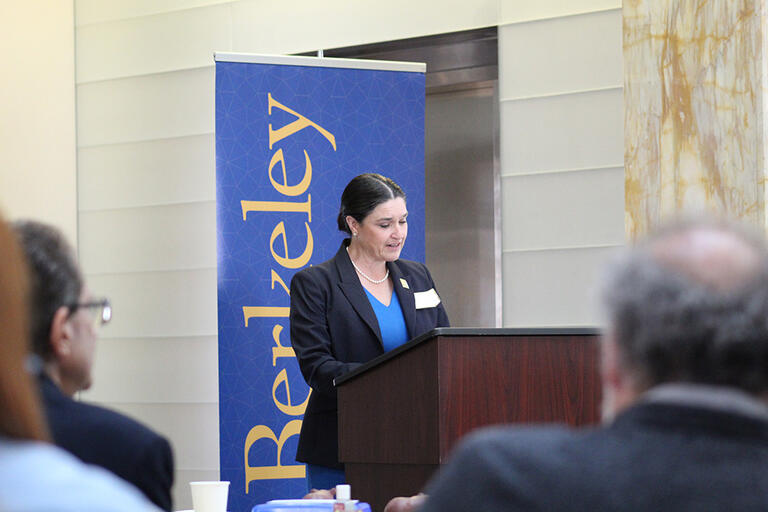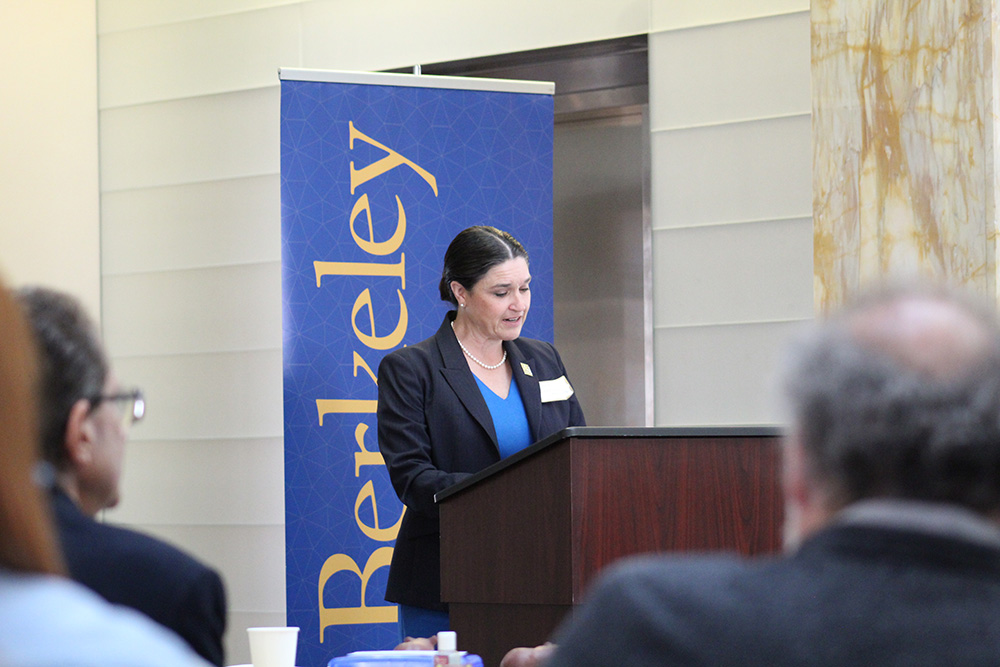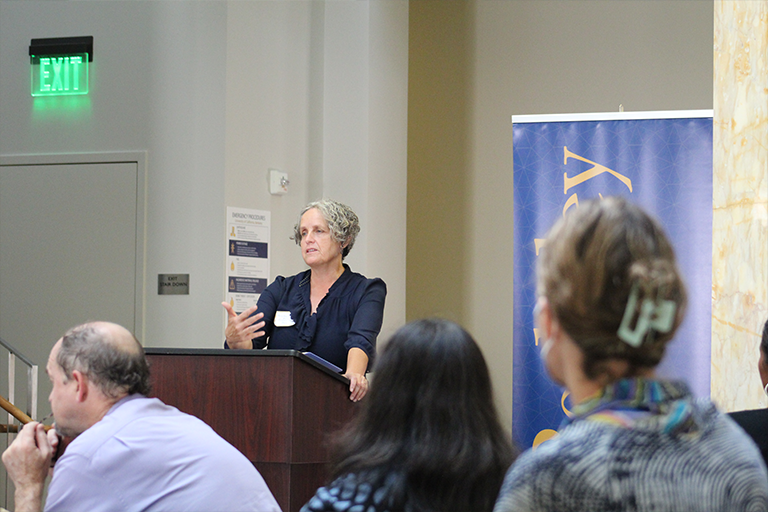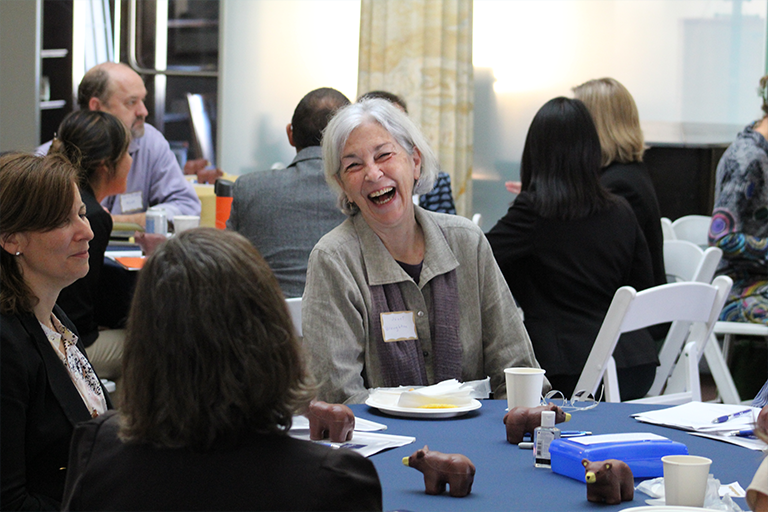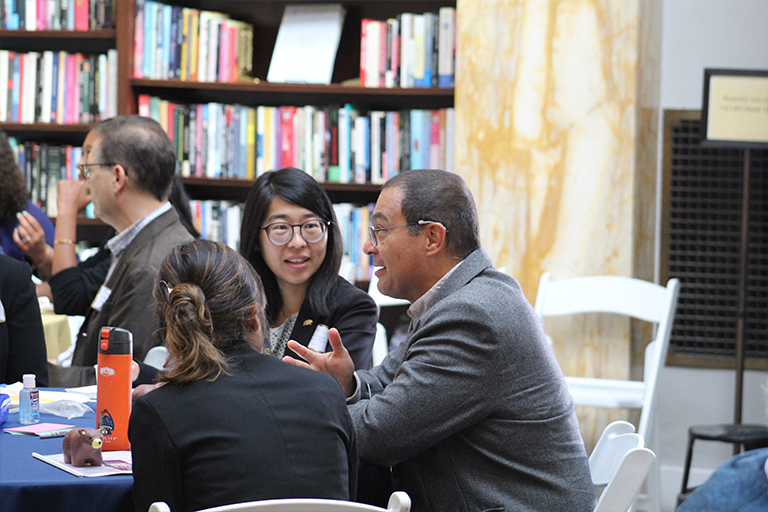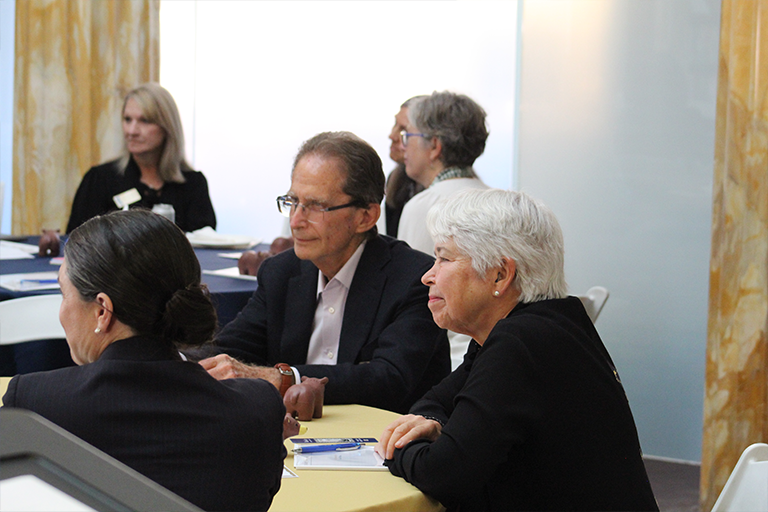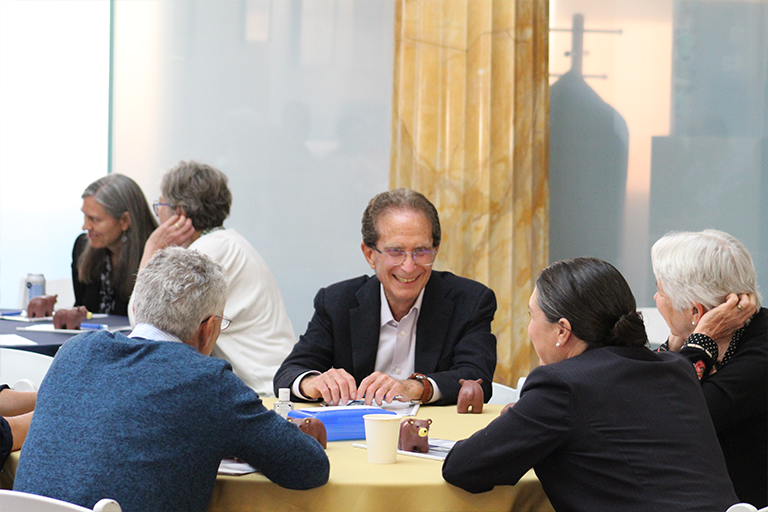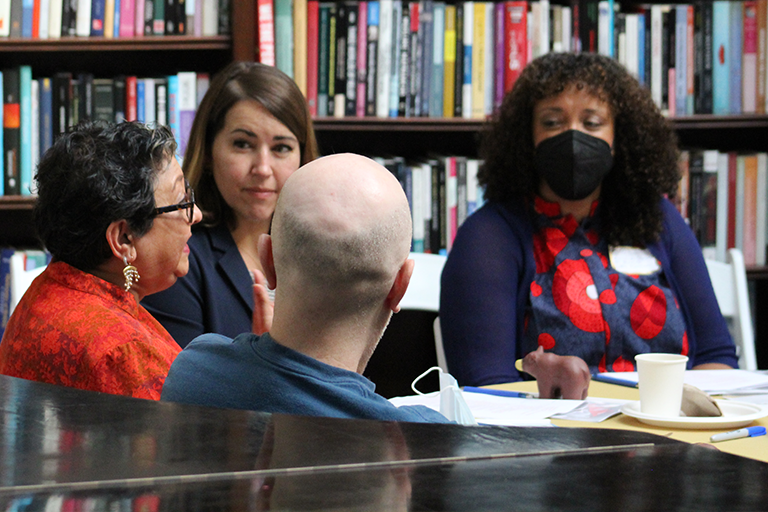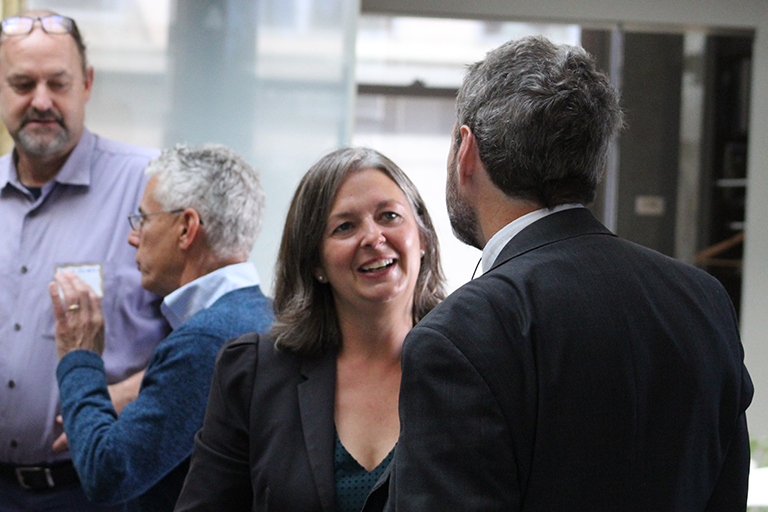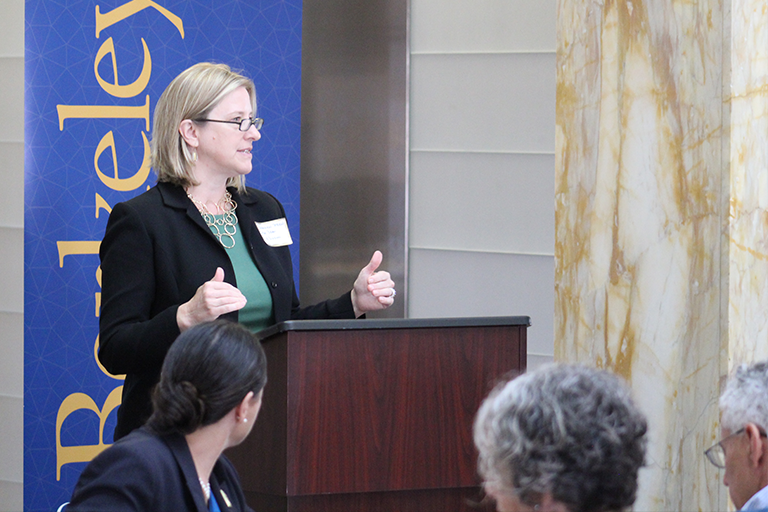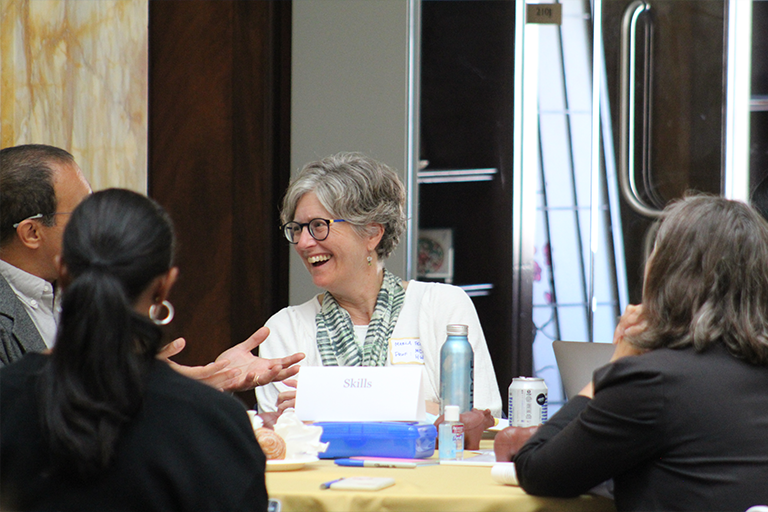Berkeley Letters & Science educates generations of students from all kinds of backgrounds for lives of meaning and purpose--as civic leaders, artists, professionals, entrepreneurs, government officials, and more.
Berkeley Letters & Science students not only seek to understand the world around them, but they also seek to improve it. What kind of education will our students need in order to make contributions beyond themselves?
In the 2022-23 academic year, we worked together to answer the question, "What skills, knowledge, and dispositions do Berkeley L&S students need now and in the future?"
Guided by the insights and support of the broader Berkeley Letters & Science community, a steering committee and five working groups delved into the aforementioned question.
Informed by key literature on the nature and future of the liberal arts, the steering committee provided strategic vision and orientation to the working groups. The steering committee convened in September and February to help align the work of the working groups.
An Extraordinary Opportunity
Over the last four decades, the world has been radically transformed: the end of the cold war; NAFTA; September 11; marriage equality; the massive expansion of internet and digital data; repeated financial crises; rising awareness of climate change; racial reckoning; and the resurgence of infectious disease. Our campus, too, has been transformed: in 1984, we had 20,000 undergraduates and the state directly funded 50% of our expenses. Today, we have over 30,000 undergraduates and the state funds 13% of our expenses. However, the requirements for a Berkeley L&S degree have not substantively changed in that time.
If we seek to educate students for a changing world, can our requirements remain unchanging?

Our world has been transformed over the last four decades. Yet, L&S requirements have remained largely unchanged -- we have an extraordinary opportunity before us.
Steering Committee
Chair: Jennifer Johnson-Hanks, Executive Dean, Letters & Science
Michael Botchan, Dean, Biological Sciences Division
Catherine Choy, Associate Dean, CDSS; Prof. of Ethnic Studies
Marla Feller, Molecular and Cell Biology
Ori Gaynor, Physics
Sara Guyer, Dean, Arts & Humanities Division
Sue Harbour, Career Center
Steven Kahn, Dean, Mathematical & Physical Sciences
Jonah Levy, Political Science
Michael Nachman, Integrative Biology
David Nadler, Mathematics
Kate O'Neill, Rausser College of Natural Resources
Raka Ray, Dean, Social Sciences
Janelle Scott, African American Studies
Shannon Steen, Theater, Dance & Performance Studies
Jessica Stevenson Stewart, Office of Undergraduate Research & Scholarships
Jay Wallace, Philosophy
James Weichert, ASUC AAVP, Senior, Computer Science & Data Science
Linda Wilbrecht, Psychology
Staff
Project Manager: Lauren Miller, Special Projects Advisor
Michelle Phillips, Director of Communications
Aileen Liu, Director of Curricular Engagement Initiatives
Rebecca Sablo, Assistant Dean for Administration & Finance
Working Groups
The five working groups may shift over the course of the project. Currently, the working groups focus on learning what kinds of skills, dispositions, and knowledge we are aiming for, with each group emphasizing the points of view of a particular constituency.
We welcome participation in these working groups from all constituents in our community. Please email lsfutures@berkeley.edu if you are interested in joining a working group. We are grateful for the invaluable engagement of our community members.
Alumni
Co-Chairs: Marla B. Feller and Caitlin LaFleur. In collaboration with the newly hired associate director of L&S alumni engagement, this group will survey L&S alumni about their experiences in and since college.
Potential Employers & Civic Leaders
Co-Chairs: Sue Harbour and Jessica Stevenson Stewart. With the collaboration of the Career Center, this group will explore what potential employers and civic leaders think our students need by way of skills, knowledge, and dispositions.
Faculty
Co-Chairs: Janet S. Broughton and Ori Ganor. This group will mostly work in person by attending faculty meetings, conducting surveys, and/or holding small town-hall meetings to gather perspectives of faculty.
Peer Institutions
Chair: Shannon Steen. This group will examine the approaches to general education taken by institutions beyond Berkeley. They will explore the philosophies at work and the structures used to implement them, as well as innovative new models under consideration. The focus will primarily involve US universities and may also include models abroad.
Students
Co-Chairs: Janelle Scott and James Weichert. In collaboration with ASUC leaders and senior staff in the office of the Vice Provost for Undergraduate Education, the Students group will survey current students, and perhaps also run focus groups.
L&S Futures Interim Report
This interim report summarizes our first year of work and charts the path for year two.
Working Group Findings Reports
The following reports were generated based on the findings of each working group over the course of their exploratory research in the 22-23 AY.
WATCH: Video highlights from the L&S Futures kick-off meeting in September 2022.
Contact Us
L&S Futures benefits from the insights and experience of all our constituents: faculty, staff, alumni, students, parents, and friends.
You can reach us anytime by emailing: lsfutures@berkeley.edu. Thank you!
In 2023-2024, the Design Committee will investigate potential changes to L&S general education based on the findings of Phase I.
The Design Committee is currently meeting to determine what changes may be necessary to support the goal set in the exploration phase. Potential changes are still being considered, but may include for example replacing our general education requirements, developing new recommended academic pathways, and integrating co-curriculars more closely into the curriculum. Most decision rights over courses and curricula sit with the L&S Executive Committee, although some changes could also require a vote of the whole L&S faculty.
Design Committee
Chair: L&S Associate Dean Shannon Steen, Department of Theater, Dance & Performance Studies
Professor Kristie Boering, Department of Earth and Planetary Sciences
Professor Cindy Cox, Department of Music
Professor Britt Koskella, Department of Integrative Biology
Professor Jonah Levy, Department of Political Science
Professor Craig Miller, Department of Molecular & Cell Biology
Professor David Nadler, Department of Mathematics
Professor Carlos Noreña, Department of History
Professor Poulomi Saha, Department of English
Professor and Associate Dean Shannon Steen, Department of Theater,
Dance, and Performance Studies
Professor Chenxi Tang, Department of German
Professor Ula Taylor, Department of African American Studies
Professor Jay Wallace, Department of Philosophy
Professor Jonathan Wurtele, Department of Physics
Design Committee
Project Manager: Lauren Miller(link sends e-mail), Special Projects Advisor
Ultimately, we seek to design and implement College requirements that best serve our students.
In addition, we hope that these requirements will meet three conditions:
-
Mission-Centered: Every College requirement should have a clear connection to our mission of educating a diverse population of students for lives of consequence. Our requirements should be grounded in the student outcomes we are seeking, and tied to the skills, knowledge, and dispositions we agree are significant.
-
Narrative: The 120 units of a degree are not a monolithic block. Our curriculum should have a trajectory—a story with a beginning, middle, and end, that students can understand and that builds progressively over their time at Berkeley. People in this age group are developing rapidly, and so first year students tend to have different needs and abilities than graduating students.
-
Simple: Our current general education requirements are very complicated. This complexity results in students not knowing where they are in relation to degree completion, a lot of administrative time and cost, a high demand on faculty to serve on CAPS, and a high number of exception requests. A future design should be significantly less complex—ideally, our whole faculty should be able to know what our undergraduate requirements are and why.
